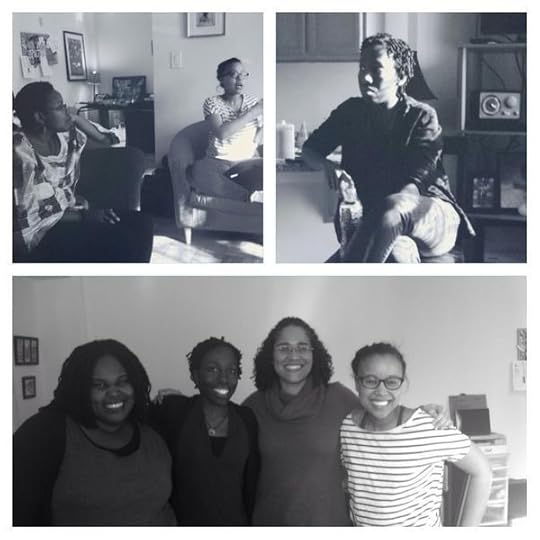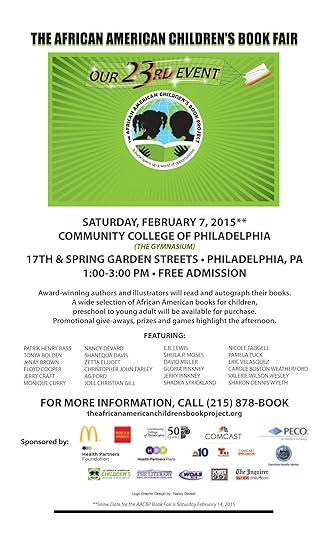Zetta Elliott's Blog, page 48
March 9, 2015
Magic & Memory
Come write with me!
MAGIC & MEMORY:
AN EXPLORATION OF AFRICAN AMERICAN HISTORICAL FANTASY
Wednesdays 6:30 – 8:30pm
April 15 – May 6
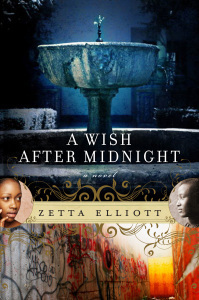 Writer-in-residence Zetta Elliott will offer a free, four-week writing class at Weeksville Heritage Center. Designed for beginners, this class will offer an introduction to historic Weeksville and an opportunity to write creatively about the 19th-century Brooklyn community.
Writer-in-residence Zetta Elliott will offer a free, four-week writing class at Weeksville Heritage Center. Designed for beginners, this class will offer an introduction to historic Weeksville and an opportunity to write creatively about the 19th-century Brooklyn community.
Participants will be required to keep a writing journal, and will be asked to read texts that combine history and fantasy (including Zetta Elliott’s time-travel novel A Wish After Midnight, which will be provided). Does fantasy fiction offer an escape from reality or can it help us to envision a more just world? Together we will consider whether magic helps African Americans to remember, reconstruct, and/or recover from the past.
Zetta Elliott is an award-winning author of thirteen books for young readers. Her novel-in-progress, Judah’s Tale, is set in historic Weeksville. She earned her PhD in American Studies from NYU and has taught at the college level for ten years. Learn more at www.zettaelliott.com.
To register for this FREE class, email writer@weeksvillesociety.org
Enrollment is limited to 20 participants.
The position of Writer-in-Residence was established with a grant from the Malka Foundation.
March 8, 2015
step by step
My two-month residency at Weeksville Heritage Center will begin in one week! We’ve set up a new blog and this is the official press release. On Friday I had some photos taken in the historic 1930s house, and right now I’m working on a flyer to advertise my writing workshop for adults—Magic & Memory: An Exploration of African American Historical Fantasy. Next step: developing the curriculum for my middle grade writers. Please spread the word!
Weeksville Heritage Center
Contact: Stephanie Cunningham
158 Buffalo Avenue
Brooklyn, NY 11213
(718) 756-5250
media@weeksvillesociety.org
Zetta Elliott to be Writer-in-Residence at Weeksville Heritage Center
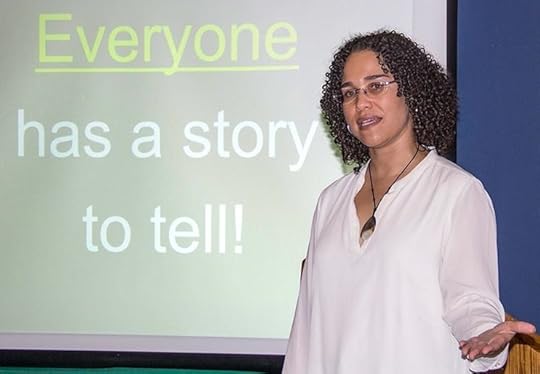 Dr. Zetta Elliott will be the inaugural Writer-in-Residence at the Weeksville Heritage Center for Spring 2015.
Dr. Zetta Elliott will be the inaugural Writer-in-Residence at the Weeksville Heritage Center for Spring 2015.
Weeksville Heritage Center, a museum charged with keeping the original spirit of the historic African American community alive, seeks to heighten family literacy in our community through innovative and impactful educational programs. Our newest initiative, Turn the Page, is an essential tool for promoting self-discovery, personal expression, and empowerment in Brooklyn.
As Writer-in-Residence, Elliott will teach historical fiction writing classes for children and adults. She will also present on her own historical novels at public schools within the Weeksville district. Elliott will host a literary salon during Poetry Month and will read from her new novel at a community reading in May.
Elliott has worked with children for twenty-five years and is the author of thirteen books for young readers, including the award-winning picture book Bird. Her time-travel novel, A Wish After Midnight, was published by Skyscape in 2010. The sequel, also set in Civil War-era Brooklyn, will be completed during the residency along with a specially commissioned picture book for children.
Born in Canada, Elliott moved to NYC in 1994 after graduating from Bishop’s University. She earned a PhD in American Studies from New York University in 2003. Elliott is an independent scholar who has taught at Ohio University, Louisiana State University, Mount Holyoke College, and Borough of Manhattan Community College. She currently conducts school visits for the Brooklyn Public Library.
As Writer-in-Residence, Elliott will have access to the research materials of the 5th of July Resource Center for Self-Determination & Freedom. She will also have a desk in the Education and Cultural Arts Building to work on her next novel and to meet with community members. Her appointment begins March 15 and ends May 16, 2015.
The position of Writer in Residence was established with a grant from the Malka Foundation.
For further information contact Tia Powell Harris, President and Executive Director of the Weeksville Heritage Center, at (718) 756-5250 or tia@weeksvillesociety.org.
March 2, 2015
we were here
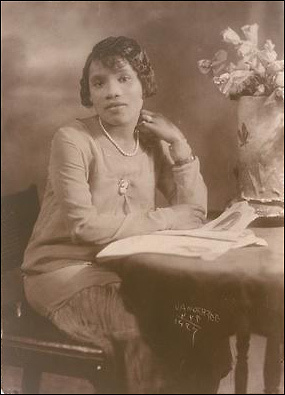
portrait by James Van Der Zee
How do you write a book about a woman with nothing but a name? I have a queue when it comes to writing projects: first in line is this essay for School Library Journal, then the sequel to A Wish After Midnight, then Billie’s Blues, then The Hummingbird’s Tongue. I’m presenting on the latter at a conference in Liverpool in June, but I still think about that project and the challenges that lie ahead. It’s no longer a book about my paternal grandmother because all I have is her name and some anecdotes that may or may not be true. So it’s becoming a different kind of book but one that’s still consistent with my overall project of fighting erasure. Last week I went over to Weeksville for a meeting with the executive director and lead educator. I’m excited to be partnering with Brooklyn Prospect Charter School; their middle grade students will take a historical fiction class with me before publishing their writing in an anthology and taking part in a community reading in May. I’m also looking forward to our literary salon, which will be by invitation only, but we’ll try to film the event. Imagine your favorite Brooklyn artists dressed in period clothes from the 1920s/30s…and I proposed an on-site portrait studio so we can take photos of the guests in all their finery—like the dignified portraits taken by James Van der Zee during the Harlem Renaissance. Everything I do during this two-month residency has to be documented so that funders know what we got up to, but also to leave a historical record. I have nothing that belonged to my grandmother (other than her name) and so have to use my imagination to create a profile of her and a picture of her life. She left nothing behind besides her two children; my father’s been gone for over a decade and my aunt has limited memories. The asylum in Antigua has no record of Rosetta’s commitment; there’s no death certificate. When I was doing research on my mother’s African American ancestors, I met with my great-aunt who proudly pulled out a pair of gloves that once belonged to her aunt. They were going to be donated to a roadside museum—a tiny wood-frame house that most travelers would likely bypass. So I asked to try the gloves on—they reached past my elbows and I felt quite elegant. But my great-aunt grew impatient and made me take them off. And I remember wondering whether it bothered her that I was Black—the only visibly Black person in a room full of people who had been raised to deny their “Negro ancestry.” On another trip to Grey County I stopped at an antiques shop and there was a large framed photograph on the wall of a nineteenth-century Black woman. The shop owner didn’t know the woman’s name and had acquired the piece through an estate sale. It was out of my price range but every once in a while I think about that woman in the portrait…unnamed, unknown, unclaimed. And now in hostile territory because the once interracial community has now become entirely white—and not by accident.
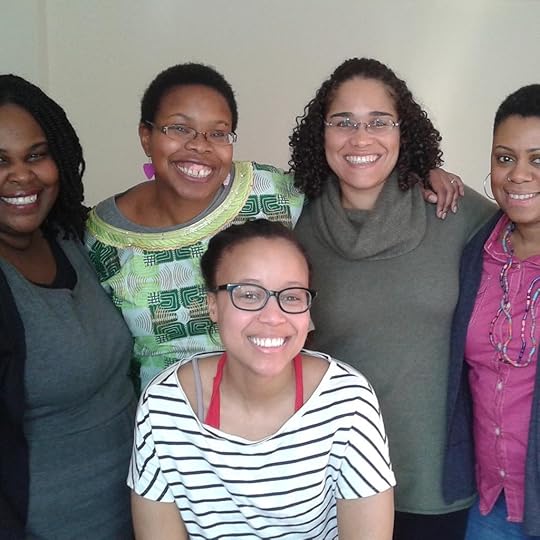
Renee Watson, Olugbemisola Rhuday-Perkovich, me, Ibi Zoboi, & Dhonielle Clayton
On Saturday we had our second Black Women Writers Hangout up in Harlem. I’d had a full week and did consider pulling out; on Friday night I went to a party and managed to mingle for more than an hour, and then got up the next morning to have breakfast in Chelsea with friends from MA. As an introvert, that meant I only had a little more to give before I shut down and slipped back under my rock. But I was so glad I went to Harlem because spending three hours with these women was invigorating! We talked about the publishing industry, and coalition building, and Empire/Game of Thrones/How to Get Away with Murder. I woke with a migraine on Sunday and took a much-needed day of silence, but I’m already looking forward to seeing these women again in April. On March 18 we’ll all be at the Schomburg to hear Renée talk about her new novel, This Side of Home, with Jacqueline Woodson (get your tickets here). Whenever we get together we always take a moment to pose for a photograph. Most of what we discuss is off the record and not to be repeated, but we still want our gatherings to be remembered. And we want other writers to know that community IS possible when you commit to those who are on the same path. That’s one of the goals of my residency: to create a community of writers on a site that historically served as sanctuary for all kinds of Black people—free, fugitive, and everything in between…
February 22, 2015
left out
 I think about my father a lot. If you read this blog regularly, you’ve probably noticed that by now. There’s a lot of debate around trigger warnings but I do give them in my classes if I’m about to show a film with potentially traumatizing content. But trigger warnings have limited effectiveness because you don’t know just what might set off a heightened reaction in one of your students. When it comes to my father, it sometimes feels like everything is a trigger. Like the time I was on an elevated train and passed over a junkyard guarded by an old dog with a limp. Suddenly everything was a blur because a stab of heart pain filled my eyes with tears as I thought about how frail my father became as he lost his battle with cancer. Last fall I bought The Contract for my cousin Kodie; he’s a mixed-race teenage boy who excels at sports. He doesn’t play baseball but I thought he might relate to Derek Jeter’s story about the code he had to live by to fulfill his dream of playing for the Yankees. I had a few issues with the terms of the contract and found myself wondering if Jeter is a Republican, but mostly I thought about my own brief time as a Little League player and all the other kids like me who didn’t grow up with two dedicated parents. I don’t have a problem with celebrity authors (Pharrell is the latest to get a book deal); we don’t live in a meritocracy, and if a professional athlete or actor can get kids to read, that’s fine by me. The Contract felt very aspirational to me, rather than inspirational. But we don’t have a lot of novels that show Black middle-class families living in the Midwest, and so that book could be a “window” for many urban kids. I did wonder, however, whether low-income urban kids being raised by working-class single mothers would buy into the idea of a contract: if you do X, Y, and Z, your end result will be Q. I’m all for promoting good sportsmanship (what’s the gender-neutral equivalent?) but much of Jeter’s success comes from his family and home life—having two educated, employed, engaged parents—factors that are out of the control of kids. As I was reading the book I found myself thinking about the moment when I realized I would never be a professional athlete. I played softball for two years and loved it, but tennis was my true passion. I had posters of Martina Navratilova (lefty!) and Boris Becker all over my room but I had no one to drive me to and from tournaments, I was paying for my own equipment and trainer with my part-time retail job, and there was no one cheering for me on the sidelines. At fifteen, I was also way too old. This was long before the Williams sisters broke onto the scene, but I’ve never been as hard on their father/coach as everyone else. When I finally let go of my tennis dreams, I knew that my success in life was entirely up to me; I decided only to pursue things that required no parental participation. Like academics—and creative writing.
I think about my father a lot. If you read this blog regularly, you’ve probably noticed that by now. There’s a lot of debate around trigger warnings but I do give them in my classes if I’m about to show a film with potentially traumatizing content. But trigger warnings have limited effectiveness because you don’t know just what might set off a heightened reaction in one of your students. When it comes to my father, it sometimes feels like everything is a trigger. Like the time I was on an elevated train and passed over a junkyard guarded by an old dog with a limp. Suddenly everything was a blur because a stab of heart pain filled my eyes with tears as I thought about how frail my father became as he lost his battle with cancer. Last fall I bought The Contract for my cousin Kodie; he’s a mixed-race teenage boy who excels at sports. He doesn’t play baseball but I thought he might relate to Derek Jeter’s story about the code he had to live by to fulfill his dream of playing for the Yankees. I had a few issues with the terms of the contract and found myself wondering if Jeter is a Republican, but mostly I thought about my own brief time as a Little League player and all the other kids like me who didn’t grow up with two dedicated parents. I don’t have a problem with celebrity authors (Pharrell is the latest to get a book deal); we don’t live in a meritocracy, and if a professional athlete or actor can get kids to read, that’s fine by me. The Contract felt very aspirational to me, rather than inspirational. But we don’t have a lot of novels that show Black middle-class families living in the Midwest, and so that book could be a “window” for many urban kids. I did wonder, however, whether low-income urban kids being raised by working-class single mothers would buy into the idea of a contract: if you do X, Y, and Z, your end result will be Q. I’m all for promoting good sportsmanship (what’s the gender-neutral equivalent?) but much of Jeter’s success comes from his family and home life—having two educated, employed, engaged parents—factors that are out of the control of kids. As I was reading the book I found myself thinking about the moment when I realized I would never be a professional athlete. I played softball for two years and loved it, but tennis was my true passion. I had posters of Martina Navratilova (lefty!) and Boris Becker all over my room but I had no one to drive me to and from tournaments, I was paying for my own equipment and trainer with my part-time retail job, and there was no one cheering for me on the sidelines. At fifteen, I was also way too old. This was long before the Williams sisters broke onto the scene, but I’ve never been as hard on their father/coach as everyone else. When I finally let go of my tennis dreams, I knew that my success in life was entirely up to me; I decided only to pursue things that required no parental participation. Like academics—and creative writing.
Ebony Thomas just posted an excellent article (“Left Out” by Andrew McCutchen) on Facebook that addresses the barriers to success that contribute to the decreasing number of African American baseball players. McCutchen uses his own journey into the big leagues to explain the violation that led Jackie Robinson West, the Little League team from Chicago’s South Side, to be stripped of its national title. He asks, “When you’re a kid from a low-income family who has talent, how do you get recognized?” And this question applies to every arena, not only sports. McCutchen’s answer is external support: “If you’re a poor kid with raw ability, it’s not enough. You need to be blessed with many mentors to step in and help you.”
When I was writing my essay on the future of children’s literature, I really wanted to cite this article on “relatability.” Have we become a society of narcissistic consumers who reject “window” texts in favor of “mirrors” only? Rebecca Mead explains that “to demand that a work be ‘relatable’ expresses a different expectation: that the work itself be somehow accommodating to, or reflective of, the experience of the reader or viewer. The reader or viewer remains passive in the face of the book or movie or play: she expects the work to be done for her.” This laziness isn’t only found in readers but reviewers, as Malindo Lo’s recent blog series reveals. Mead rightly concludes that “to reject any work because we feel that it does not reflect us in a shape that we can easily recognize—because it does not exempt us from the active exercise of imagination or the effortful summoning of empathy—is our own failure.” So I tried to be conscious of my own issues as I read The Contract, and I hope it is inspiring to kids of all races and classes, from various family configurations. My cousin’s Black father is largely MIA, and his white mother has her hands full with two younger kids. But he does have uncles and aunts who step in and pay for his equipment and training camps. And I hope that will be enough, even as I know that nothing can take the place of an engaged, present parent.
I recently read When I Was the Greatest by Jason Reynolds and was impressed by the family he created for his male protagonist. Ali’s mother is a social worker but to make ends meet, she works a retail job on the side. His father was once incarcerated for shooting a man during a robbery, and now lives out of his car because selling boosted luxury goods doesn’t pay the rent. Ali’s mother warns him against turning out like his father but she doesn’t forbid her kids from seeing him. They all acknowledge and accept his limitations, and in the end, his ability to trade in illegal goods saves the day. As far as I know, my father never broke the law; he was a Christian conservative who voted Republican and got annual Christmas cards from Jim and Tammy Baker. My dad was a good Special Ed. teacher but he wasn’t a perfect parent, and he encouraged me to play sports but rarely showed up for my games. I’m drawn to texts with dysfunctional families and know I’m biased against Stepford-type families, which seem unrealistic to me. But if I didn’t grow up reading about perfect nuclear families, I wouldn’t know that anything else was possible. I remember my shock when my college roommate’s parents called her EVERY night, listened to her talk about her day, and then hung up only after saying, “I love you!” about a dozen times. People actually DO that in real life? My mother still only calls me twice a year, but we started ending our phone conversation with “I love you” because I aspired to have the relationship my roommate had with her mother. Art can compensate for experience by showing us another way of being in the world, which is why we need windows and mirrors—the latter to show us that we’re not alone, and that we can survive the conditions over which we have no control.
Ok, the sun has finally come out so I better hit the park…
February 19, 2015
crunching the numbers
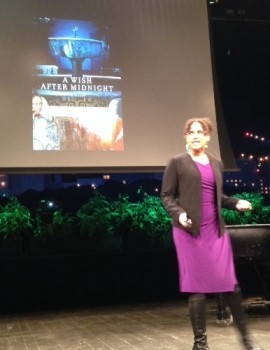 People often say, “Numbers don’t lie,” but statistics can be misleading and are too easily used to uphold an illusion rather than to reveal the truth. I grew up with a mother who was obsessed with losing weight; my father shamed my mom about her body throughout their marriage, and she has spent a lifetime feeling uncomfortable/guilty/ashamed about food. My older sister has tried every diet in the book and she’s been a committed gym-goer for years. I didn’t want to live my life like that, and so I refused to buy a scale and I ate whatever I wanted. But twice now my weight has gone up to unhealthy levels and so I find that I have become a version of the women in my family. I’m still holding out on the gym but I weigh myself daily, and yesterday I learned that my BMI has gone down one point (it’s 25, which apparently still puts me in the “overweight” category; 24.9 would be “normal”). My doctor was pleased with my weight loss and I fasted for my blood test this time, so we’ll see if my “bad” cholesterol level has gone down. I haven’t given up cake and I just had oatmeal and kettle corn popcorn for breakfast, so I still have work to do to establish a healthy relationship with food. I don’t want to count calories and obsess over my weight (I’ve got an 85-day streak on My Fitness Pal), and yet I cringed when I saw the photos taken while I was on stage during the Blackademics TV taping last week. Being a writer appealed to me as a teen in large part because it was a way to be disembodied; I thought people would only hear my voice in the words printed on the page, and that meant I could remain safely invisible. It’s almost a miracle that I became an educator because as a teen, I was terrified of speaking in front of others. I wasn’t shy—I was afraid of being scrutinized because when my father took a good look at me, his face would screw up with disgust over my teenage acne. I still have acne and at 42 I’m as pudgy as I was at age 2, but that won’t keep me away from the mic. And I guess I have to accept that writers DO have an image, and looking fabulous is nice but not always possible—or necessary. I don’t have kids but whenever I get down on myself, I imagine that I have a daughter. Would I talk to her that way? Would I allow her to talk to herself that way? NO. Still aiming for body positivity…
People often say, “Numbers don’t lie,” but statistics can be misleading and are too easily used to uphold an illusion rather than to reveal the truth. I grew up with a mother who was obsessed with losing weight; my father shamed my mom about her body throughout their marriage, and she has spent a lifetime feeling uncomfortable/guilty/ashamed about food. My older sister has tried every diet in the book and she’s been a committed gym-goer for years. I didn’t want to live my life like that, and so I refused to buy a scale and I ate whatever I wanted. But twice now my weight has gone up to unhealthy levels and so I find that I have become a version of the women in my family. I’m still holding out on the gym but I weigh myself daily, and yesterday I learned that my BMI has gone down one point (it’s 25, which apparently still puts me in the “overweight” category; 24.9 would be “normal”). My doctor was pleased with my weight loss and I fasted for my blood test this time, so we’ll see if my “bad” cholesterol level has gone down. I haven’t given up cake and I just had oatmeal and kettle corn popcorn for breakfast, so I still have work to do to establish a healthy relationship with food. I don’t want to count calories and obsess over my weight (I’ve got an 85-day streak on My Fitness Pal), and yet I cringed when I saw the photos taken while I was on stage during the Blackademics TV taping last week. Being a writer appealed to me as a teen in large part because it was a way to be disembodied; I thought people would only hear my voice in the words printed on the page, and that meant I could remain safely invisible. It’s almost a miracle that I became an educator because as a teen, I was terrified of speaking in front of others. I wasn’t shy—I was afraid of being scrutinized because when my father took a good look at me, his face would screw up with disgust over my teenage acne. I still have acne and at 42 I’m as pudgy as I was at age 2, but that won’t keep me away from the mic. And I guess I have to accept that writers DO have an image, and looking fabulous is nice but not always possible—or necessary. I don’t have kids but whenever I get down on myself, I imagine that I have a daughter. Would I talk to her that way? Would I allow her to talk to herself that way? NO. Still aiming for body positivity…
The other numbers worth talking about are the 2014 stats released by the Cooperative Children’s Book Center yesterday. I was astonished to see that the number of books ABOUT Blacks nearly doubled since last year. What’s going on? Well, it’s not as encouraging as you might think. Check out this chart from the CCBC, which shows books BY and ABOUT and BY BUT NOT ABOUT:
 In 2013, 68 books were BY Black creators (authors/illustrators) and 93 books were ABOUT Blacks. In 2014, the number of Black creators went up to 84 and the number of books about Blacks skyrocketed to 179. This is why we MUST talk about equity when discussing diverse books. The spike in books ABOUT Black people is probably due to the fact that whites are writing stories about us. So there’s no real significant redistribution of power. The CCBC reviewed 3500 books and if we add up all the creators of color, we get 288 or 8%. The number of books ABOUT people of color adds up to 393 or 11%. I’m not great with numbers but that means white creators make up 92% of those published and books about whites make up 89%. How do we figure out how many books are BY whites but not ABOUT whites? We will have more diverse books if members of the dominant group write about those of us who have been marginalized. But the POINT is to let those who have been marginalized tell their own stories in their own way. Which means we still have a LONG way to go…
In 2013, 68 books were BY Black creators (authors/illustrators) and 93 books were ABOUT Blacks. In 2014, the number of Black creators went up to 84 and the number of books about Blacks skyrocketed to 179. This is why we MUST talk about equity when discussing diverse books. The spike in books ABOUT Black people is probably due to the fact that whites are writing stories about us. So there’s no real significant redistribution of power. The CCBC reviewed 3500 books and if we add up all the creators of color, we get 288 or 8%. The number of books ABOUT people of color adds up to 393 or 11%. I’m not great with numbers but that means white creators make up 92% of those published and books about whites make up 89%. How do we figure out how many books are BY whites but not ABOUT whites? We will have more diverse books if members of the dominant group write about those of us who have been marginalized. But the POINT is to let those who have been marginalized tell their own stories in their own way. Which means we still have a LONG way to go…
February 17, 2015
talking back
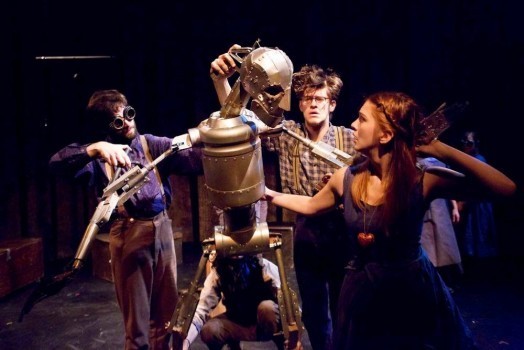 The essay that was due last month is finally done! The finished version differs greatly from the essay I started back in December, but I think that’s ultimately a good thing. I finally had a chance to quote Cathy J. Cohen and Kyra, whose important essay, “How to Uphold White Supremacy by Focusing on Diversity and Inclusion,” should be required reading for everyone who claims to be invested in the diversity debate. I see a matinee in my near future and there will be puppets later this week. Then it will be time to turn back to novel-in-progress #1. For now, here’s a taste of my essay, which will appear in a forthcoming textbook on children’s literature.
The essay that was due last month is finally done! The finished version differs greatly from the essay I started back in December, but I think that’s ultimately a good thing. I finally had a chance to quote Cathy J. Cohen and Kyra, whose important essay, “How to Uphold White Supremacy by Focusing on Diversity and Inclusion,” should be required reading for everyone who claims to be invested in the diversity debate. I see a matinee in my near future and there will be puppets later this week. Then it will be time to turn back to novel-in-progress #1. For now, here’s a taste of my essay, which will appear in a forthcoming textbook on children’s literature.
I can’t breathe.
I am a Black feminist writer committed to social justice. I write stories about Black children and teens, but within the children’s literature community I struggle to find what poet June Jordan calls “living room.” In “Moving Towards Home,” Jordan empathizes with the Palestinian people as she envisions a space free from persecution:
I need to speak about living room
where the talk will take place in my language
I need to speak about living room
where my children will grow without horror
I need to speak about living room where the men
of my family between the ages of six and sixty-five
are not
marched into a roundup that leads to the grave
I need to talk about living room
where I can sit without grief without wailing aloud
for my loved ones
. . . . . . . . . . . . . . . . . . . . . . . . . . . . . . . . . . . . . . . . . . . . . . . . . . .
I need to talk about living room
because I need to talk about home
I have been asked to write about the future of children’s literature but right now I need to talk about home. If “home” represents sanctuary—a safe space where one can speak in one’s authentic voice and not only survive, but thrive—then the children’s literature community is not my home. I must make my predictions as an outsider.
By industry standards, I am a failed author. Since I started writing for young readers in 2000, only three of my thirty stories have been published traditionally. I turned to self-publishing as my only recourse, and then faced the contempt of those who see self-publishing as a mere exercise in vanity. Last year a white woman Facebook “friend” suggested that my decision to self-publish was analogous to Blacks in the civil rights era choosing to dine in their segregated neighborhood instead of integrating Jim Crow lunch counters in the South. In her mind, self-publishing is a cowardly form of surrender; to be truly noble (and, therefore, deserving of publication) I ought to patiently insist upon my right to sit alongside white authors regardless of the hostility, rejection, and disdain I encounter.
February 12, 2015
teamwork
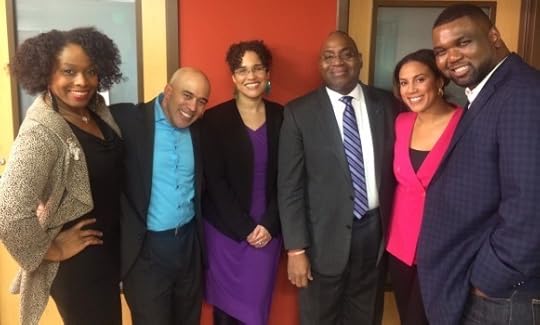
l-r: Denise Hart, Kevin M. Foster, me, Michael Scantlebury, Natalie M. Cofield, and Scot Brown
I’ve been wound up for weeks but my Blackademics TV taping is finally over, and now I have time to reflect on the experience. Often when I summarize events, I try to lead with what I like because I have a few complaints to share. But my first trip to Texas was just amazing—I think this is the first time I’ve worked with a team that was SO friendly, supportive, and efficient. I had a little trouble flying out because American Airlines canceled their direct flights from JFK; I found out by text on Monday morning, and was placed on an earlier flight leaving from LaGuardia but hadn’t yet packed or purchased a blazer to wear over my “jewel-tone” dress. But as soon as the plane landed in Austin, I was so well taken care of that I didn’t have to worry about a thing (besides my presentation). I was chauffeured from airport to hotel to the KLRU studio; when I woke up on Tuesday with a budding migraine, everyone on the Blackademics team was solicitous and made sure I had some downtime at the hotel before the taping began. My assigned performance coach, Denise Hart, didn’t chastise me for not 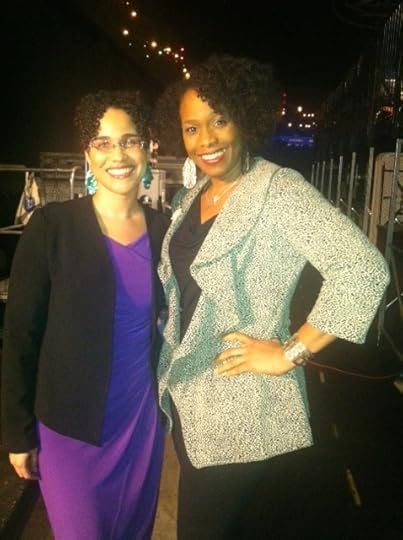 scheduling a second consultation back in January. I only finished my presentation the night before my flight, but as I rehearsed on Tuesday I could “feel the love”—Denise was clapping and I could hear an “amen corner” of supporters in the back of the studio. One of the presenters brought his wife and she encouraged ALL of us—and turns out she’s from Toronto! The makeup artist expertly applied “HD foundation” and didn’t add anything else without my consent (I took her advice and went for a little blush but kept on my own lip gloss). I stumbled a few times during the recording and we had a little trouble with the remote for the slides, but I could tell that the audience was appreciating my presentation. And when it was over, I went backstage and got a big hug from Denise and plenty of praise from the rest of the team. I got to watch the rest of the presenters and they all engaged the audience in their own unique way. Then the taping came to an end and I felt someone tap me on the shoulder; I turned and a young woman of color thanked me for my presentation before saying, “You know, until I heard you tonight I never realized that I only had ONE Black book when I was a child. It was Mufaro’s Beautiful Daughters and my sister and I wouldn’t let our parents give that book away, it meant so much to us. You really made me think about that—ONE book.” Another young woman told me she had tears in her eyes during my talk because she kept thinking about her nephews and the books they won’t get to read because they simply don’t exist. “They’ll exist if you write them and publish them yourself!” I told her. I’m becoming quite the evangelist when it comes to self-publishing! It does feel like a mission at times.
scheduling a second consultation back in January. I only finished my presentation the night before my flight, but as I rehearsed on Tuesday I could “feel the love”—Denise was clapping and I could hear an “amen corner” of supporters in the back of the studio. One of the presenters brought his wife and she encouraged ALL of us—and turns out she’s from Toronto! The makeup artist expertly applied “HD foundation” and didn’t add anything else without my consent (I took her advice and went for a little blush but kept on my own lip gloss). I stumbled a few times during the recording and we had a little trouble with the remote for the slides, but I could tell that the audience was appreciating my presentation. And when it was over, I went backstage and got a big hug from Denise and plenty of praise from the rest of the team. I got to watch the rest of the presenters and they all engaged the audience in their own unique way. Then the taping came to an end and I felt someone tap me on the shoulder; I turned and a young woman of color thanked me for my presentation before saying, “You know, until I heard you tonight I never realized that I only had ONE Black book when I was a child. It was Mufaro’s Beautiful Daughters and my sister and I wouldn’t let our parents give that book away, it meant so much to us. You really made me think about that—ONE book.” Another young woman told me she had tears in her eyes during my talk because she kept thinking about her nephews and the books they won’t get to read because they simply don’t exist. “They’ll exist if you write them and publish them yourself!” I told her. I’m becoming quite the evangelist when it comes to self-publishing! It does feel like a mission at times.
I had hoped to enjoy some Mexican food while I was in Austin, but instead we went back to the Africana Studies Department after the show ended and enjoyed some Texas-style “cowboy beans.” I did wake at 6am the next day with a migraine, but it was relatively mild and I was feeling fine by the time Tiffany picked us up from the hotel and drove us to the airport. We talked politics and police brutality before parting ways with hugs and promises to keep in touch. I’m so grateful for the opportunity to participate in this fantastic program; Dr. Kevin M. Foster developed the show to connect scholars with the community, and he permitted me to present even though I’m technically not an academic. It’s nice to know there’s a place for an independent scholars/artist/intellectual/activist like me! I’m not sure when the show will actually air, but I’ll be sure to let you know. I’m looking forward to having next week off—no school visits, which means plenty of time to write…
February 5, 2015
make it plain
I’ve got three days left to develop a ten-minute talk for the folks in Austin. It shouldn’t be so hard but I find myself wanting to include quotes from other scholars, and photos from my childhood, yet I haven’t actually described my own books, and how on earth am I going to remember everything? I scoffed at those who asked about using a teleprompter but now I’m wondering if I should, too. I’m used to letting my slides guide me when I present in schools, but this is different. This is a live taping in front of an audience of strangers, and I’m expected to turn my own scholarship into something that matters to “everyday people.” I timed myself earlier today and my two-page script only took me 5 minutes to read. It could be a long weekend…
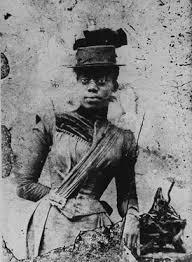 I plan to talk about Weeksville in my presentation, and will find a way to announce that I will be the inaugural writer-in-residence at the Weeksville Heritage Center this spring! We haven’t ironed out all the details but this truly is a dream come true. I used to haunt Weeksville, sending endless copies of my books in the hope that someone would say, “We could use a writer like her around here!” But no one ever did until last fall when I met the new executive director, Tia Powell Harris, who wants to make literacy a priority at the center—as it was when Weeksville was founded in the 1800s. I’ll be teaching writing workshops for kids and adults, hosting a literary salon (in period costume, I hope!), and WRITING. I will finally finish the sequel to A Wish After Midnight and I’ll develop a picture book about Weeksville to engage the many children who visit the center. Basically I’ll be doing whatever I can to bring people to this historic Brooklyn community.
I plan to talk about Weeksville in my presentation, and will find a way to announce that I will be the inaugural writer-in-residence at the Weeksville Heritage Center this spring! We haven’t ironed out all the details but this truly is a dream come true. I used to haunt Weeksville, sending endless copies of my books in the hope that someone would say, “We could use a writer like her around here!” But no one ever did until last fall when I met the new executive director, Tia Powell Harris, who wants to make literacy a priority at the center—as it was when Weeksville was founded in the 1800s. I’ll be teaching writing workshops for kids and adults, hosting a literary salon (in period costume, I hope!), and WRITING. I will finally finish the sequel to A Wish After Midnight and I’ll develop a picture book about Weeksville to engage the many children who visit the center. Basically I’ll be doing whatever I can to bring people to this historic Brooklyn community.
Ok, back to my BlackademicsTV talk. Still haven’t figured out what to wear, of course…
February 3, 2015
See you in Philly!
I have a few days this week to prepare my BlackademicsTV talk on race and symbolic annihilation in children’s literature. Then it’s off to Philadelphia on Saturday for the annual . If you’re in the area, please stop by and meet the many award-winning authors who are participating in this event. February also means it’s time for the National African American Read-In, so grab a book and read! And check out Dr. Ebony Thomas’ brilliant post on the urgent need to “diversify the metaphors we read by.” I just started Jason Reynolds’ When I Was the Greatest, which just won the Coretta Scott King John Steptoe New Talent Award. You should also head over to The Brown Bookshelf to meet the book creators featured in their annual 28 Days Later. Lastly, in case you missed it, the YMAs were announced yesterday—the most diverse group of winners EVER! Here’s a list of the winners and honorees. Congratulations to all the writers and illustrators!
February 1, 2015
power surge
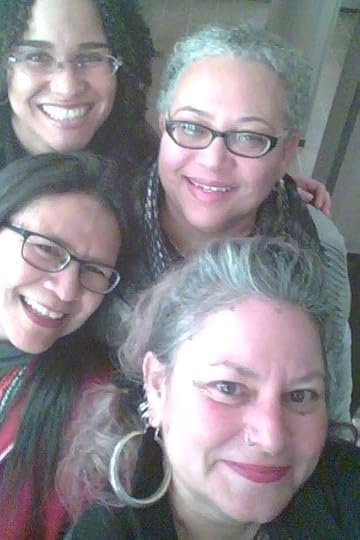
Clockwise from top: me, Edith Campbell, Maya Gonzalez, and Debbie Reese.
Friday was the ALSC’s Day of Diversity. By mid-afternoon I was feeling somewhat drained; I’d just taken my migraine medication and ideally would have gone to bed for an hour or two, but my breakout session was coming up so I needed to stay alert. I slipped out of the main meeting room during the post-lunch panel and went to the ladies room; as I was washing my hands, Debbie Reese came in and we laughed about our shared need for a “time-out.” Less than five minutes later, Maya Gonzalez came into the bathroom and we decided we had to photograph this impromptu meeting of women of color. Selfie taken, we resumed our conversation about what we were feeling in our bodies as the panelists and speakers shared their views about the publishing industry’s problem with diversity. “Has anyone seen Edi?” I asked, and one minute later the door to the ladies room opened once more and Edi appeared! We snapped two more selfies to capture the moment; in the first one we were screaming and in this one we’re smiling. That sort of sums up the range of emotions we felt throughout the day. So as I summarize my impressions of the Day of Diversity, I want to begin with this important point:
A room of our own. Discussions about diversity can be exhausting for people of color. As Maya pointed out, it would be great to have a lounge or some other private space for PoC who need a break from the dominant group. Different kinds of conversations become possible when we’re on our own, not self-censoring and freely expressing our ideas and emotions in a safe space. We also need a place to recover and step away from well-intentioned individuals who may or may not know (or care) that they’re making problematic remarks. Which brings me to my next point…
White folks have work to do (or “why you all need a private room, too). Overall, I thought the day was a significant achievement for the organizers. I was thrilled to meet several “virtual”/online friends for the first time, and I connected with like-minded educators, writers, and librarians in the field—most of whom were PoC. The 100 invited guests shared a commitment to diversity in an abstract sense, but at times it felt like the discussions were only scratching the surface; the recommended readings were never referenced, which gave the day a sort of “Diversity 101″ feel. I heard several euphemisms for “racism” and wondered why that word (along with “white supremacy” and “dominance”) was being avoided. Near the end of my morning breakout session I finally inserted those words into a conversation about self-publishing (a frustrated Black woman writer asked if it was a viable option and was told to “keep trying” to break into the traditional publishing industry). At the very end of the day, a white woman from my group said, “I heard a word today—“ microaggression “—that I’d never heard before. Wait—did YOU say that?” Yes, I did. And what does it mean that we’re trying to change an industry/community that is overwhelmingly white if the potential changemakers don’t have the necessary vocabulary and awareness of power dynamics? I hope the next diversity event includes a workshop on how to recognize and fight white privilege and bias in the children’s literature community. Because having good intentions isn’t enough. Laura Atkins would be the ideal person to lead such a workshop!
Teaching tolerance. I’m very grateful to organizer Allie Jane Bruce who invited me to serve as a co-facilitator for the afternoon breakout session on partnering to promote diversity. I don’t generally get invited to “mainstream” events like these, and I was also appreciative and impressed that organizers helped with travel funds because I probably wouldn’t have been able to attend otherwise. My session co-facilitators, Monica Olivera and Beatriz Pascual-Wallace, were fantastic and our group members had some great ideas about overcoming the many challenges in connecting with and serving diverse populations. There was clear resistance to self-publishing—I know, because it was voiced by the women sitting next to me—but there was also obvious interest in community-based publishing. If you’re trying to connect with people who feel books aren’t for them, why not try making them PRODUCERS of books and see what happens? We simply don’t have time to wait for traditional publishers to recognize and respond to the needs of our diverse communities. A librarian friend recently mentioned on Facebook that a young patron asked for a book about Michael Brown. How long do you think it will take for THAT book to exist? Or any books for kids about police brutality? Don’t hold your breath. But a librarian willing to think and work outside the box could help her patrons create a book about the situation in Ferguson. That was one of the highlights of my day—staying behind after my breakout sessions ended and answering questions from the writers, librarians, and educators who want an alternative to the existing system. Which brings me to my next point…
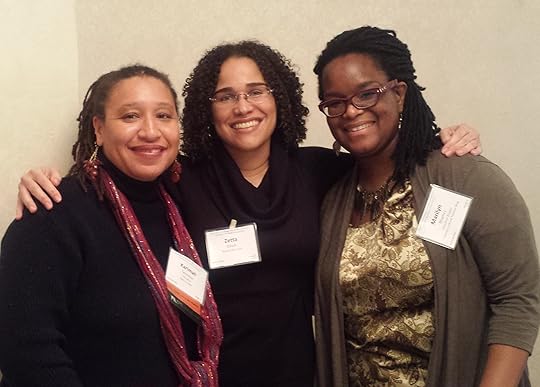
These middle school teachers, Karimah and Marilyn, were inspiring! Already doing great work with their students and now planning to self-publish some of their students’ work!
To the left… Hilary Clinton needs Elizabeth Warren. Hilary—if she decides to run for president—will need to woo voters on the Left who feel she’s too centrist and not fighting for the working class. Self-publishing is to traditional publishing what Warren is to Clinton, and yet no one from the far left was represented at the Day of Diversity. Which is a shame, because the field is READY. Edith Campbell recently shared an American Libraries article with me that shared how public libraries are helping patrons to create their own books. Self-publishing democratizes the publishing process; it allows PoC in particular the chance to tell their stories their way without having to deal with (mostly white) editors who lack the cultural competence to assess their work. If we agree that the playing field is NOT level, why then do we expect the system that created that uneven field to suddenly start working for us? It was frustrating to hear so many people talking about commercial books and bestsellers and the need to “prove” to publishers that diverse authors can turn a profit (which definitely happens when you write about white kids). Why is profit our top priority? Community-based publishing puts people before profit. I wish there had been space for that perspective at the Day of Diversity.
“Power must be shared.” Maya reminded me of this important fact; we were scribbling notes to one another during the second panel and sighed with relief when Pat Mora finally reminded the attendees that publishing is really about POWER. That’s why change has come so slowly to the publishing industry—those with power simply don’t want to let go. I did meet some remarkable, radical women in Chicago. Maya noted that Black women writers were missing from the three panels, but the Black women moderators were fantastic. Violet Harris reminded us that the Supreme Court recently rolled back voting rights and then turned around and granted rights to LGBT people, so we have to be vigilant and vocal when people talk about “progress.” Satia Orange gave a rousing speech as the day drew to a close, reminding attendees that BLACK LIVES MATTER and some of our kids are being shot dead in the street and even in their own homes. Black youth are being groomed for an early death and/or prison and the tools they need to avoid this fate are being deliberately withheld. These are our “urgencies” but do I think most attendees left thinking about Tamir Rice or Aiyana Stanley-Jones or the school-to-prison pipeline ? No. Everyone agreed that we still have a LOT of work to do, and the Day of Diversity was another small step forward. But we really can’t afford to “go slow.” As keynote speaker Camila Alire reminded us, the number of books about PoC has actually gone DOWN in the past decade…

